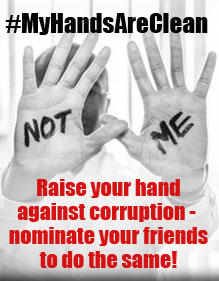
As part of our campaign, we urge you to publicly announce your positive stand against corruption. Join our team of corruption fighters who expose corruption where they see it, but are also willing to monitor their own behaviour before holding others to account.
#MyHandsAreClean is a response to the growing awareness of how corruption affects young people.
“The pervasiveness of corruption in our country … is robbing our youth of their rightful inheritance. Corruption is insidious and corrosive, and the damage that it wreaks today will be felt well into the future by those who had no part in it, or at least are relatively free from blame,” writes Corruption Watch board chairperson, Archbishop Njongonkulu Ndungane, in the organisation's 2014 annual report.
Young people are a major factor in getting the scales to tip in favour of anti-corruption. Our youth campaign aims to educate youth about corruption and encourage them to raise their voices and take action against this problem.
One of the ways that they can do this is to participate in our nomination challenge. We’re encouraging our community of corruption fighters across all platforms to take selfies of their hands and nominate their friends to do the same!
- Example:
#MyHandsAreClean
Jane, Paul, Andrew #KeepYourHandsClean, you have 24hours to raise your hand against corruption!
Getting the youth involved
To make a meaningful impact, Corruption Watch has is committed to engaging and mobilising the youth in creative and innovative ways. On 9 December, International Anti-Corruption Day, we released an anti-corruption song, performed by up-and-coming singer Fiesta Black, that has garnered substantial support.
In a more direct way, Corruption Watch has begun engaging with about 30 young leaders regarding their experiences and perceptions of corruption, as well as solutions on how to combat it. This diverse group of young leaders, drawn from across South Africa, is made up of chief executive officers, SRC presidents from universities and colleges, members of debating teams in secondary schools and tertiary education, and youth participants in leadership programmes and community-based organisations. This forum of young leaders will become the face of the Corruption Watch Youth Campaign and will inform our continuing strategy on engaging South Africa’s young people.
With the FunDza Literacy Trust, Corruption Watch published a seven-chapter short story about corruption affecting youth in the driving licence sector. The drama, called Licensed to Lie, was available on our website and Mxit app. By allowing young people to identify with the characters, the story educated them about how to identify and resist corruption when they apply for their drivers’ licences. There are two more stories scheduled for the first half of 2015, highlighting corruption in the police and education sectors.
Our various youth surveys have confirmed that this group is deeply concerned about corruption, and 70% of them have been affected by corruption in some way: “I had to pay a bribe”, “I didn’t have access to proper basic services”, and “I was less likely to get work” are just some of the comments we received.

